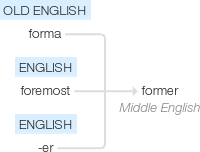Former
Middle English: from Old English forma (see foremost) + -er2.
wiktionary
From Middle English former, comparative of forme(“first”), from Old English forma(“first”), descended from Proto-Germanic *frumô. Parallel to prior (via Latin), as comparative form from same Proto-Indo-European root. Related to first and fore (thence before), from Proto-Germanic.
form + -er
etymonline
former (adj.)
"earlier in time," mid-12c., comparative of forme "first, earliest in time or order," from Old English forma "first," from Proto-Germanic *fruma-, *furma-, from PIE *pre-mo-, suffixed (superlative) form of root *per- (1) "forward," hence "in front of, before, first." Probably patterned on formest (see foremost); it is an unusual case of a comparative formed from a superlative (the Old English -m is a superlative suffix). As "first of two," 1580s.
former (n.)
"one who gives form," mid-14c., agent noun from form (v.). The Latin agent noun was formator.
